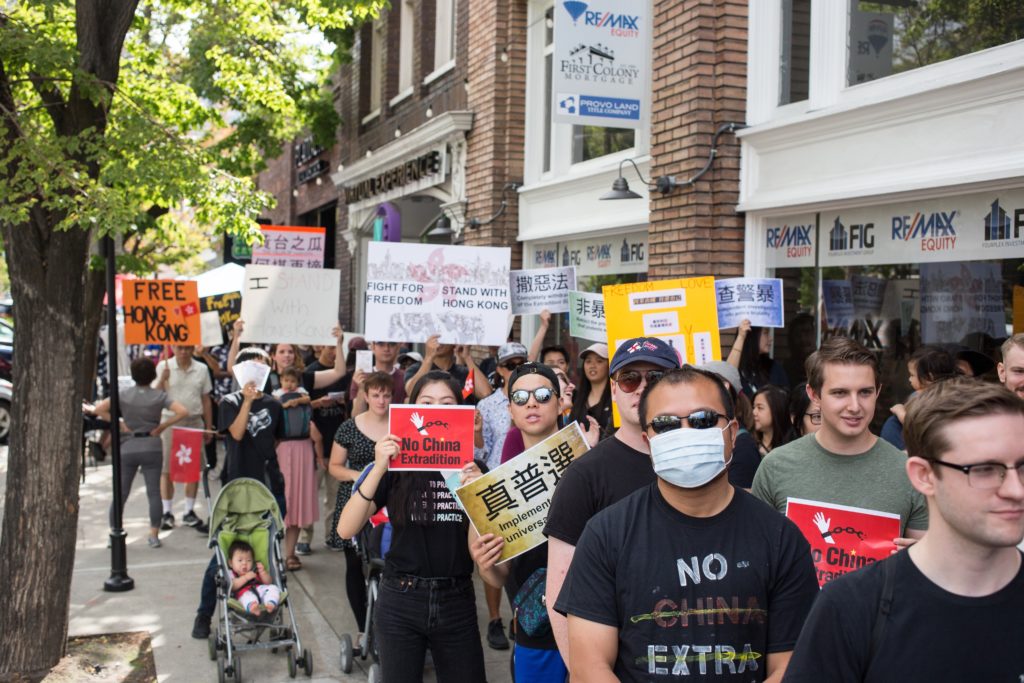
Over 100 peaceful marchers crossed Provo on Aug. 17 in support of the pro-democracy movement in Hong Kong. Now, as Congress considers policy responses to the Hong Kong protests, local proponents of the movement expressed hope that the U.S. government will show solidarity for the city state.
The Hong Kong protests — which first centered on a controversial extradition bill but have now expanded to focus on all democratic freedoms and Hong Kong’s autonomy — are nearing their 16th week and show no signs of letting up.
Hong Kong native and current Provo resident Erin Styles has followed the protests carefully on the news. As the situation escalated, Styles said she felt the need to act and show her support for her fellow Hongkongers.
She created a public Facebook event, and last month, participants gathered downtown in response to her invitation and began their peaceful march across Provo.
“We want to stand united with the people in Hong Kong,” Styles said. “What matters to them also matters to us. … We want to see our loved ones able to enjoy all the democratic freedoms which they, up until now, have been able to enjoy.”
Though Hong Kong Chief Executive Carrie Lam withdrew the extradition bill on Sept. 4, Hong Kong protesters are now saying that isn’t enough. They want more protections for their democracy, such as free elections without Chinese interference.
Styles said she is considering planning another local event if the situation in Hong Kong doesn’t improve.
BYU political science and Asian studies professor Eric Hyer said he fears the protests in Hong Kong will become increasingly violent as the more moderate participants drop off.
“I don’t know honestly that anybody really knows how this is going to end up,” he said. “It’s gone on now longer than any of the other demonstrations, and it’s showing really no signs of resolving.”
Styles expressed her hope that the American government and people will stand united with Hong Kong and support the democracy movement.
The Congressional Executive Committee on China met on the morning of Tuesday, Sept. 17, to discuss U.S. policy responses to the situation in Hong Kong. Congressman Ben McAdams, who sits on the committee, expressed his support for the democracy movement during the meeting.
“The struggle for freedom and democracy in Hong Kong and fights for freedom of conscience, freedom of religion and freedom of individuality is one that we’re familiar with as Americans,” McAdams said. “Their story is our story.”
Hyer said the U.S.’s response to the protests could have a serious impact on relations with China — an impact U.S. citizens would almost certainly feel.
One of the policy responses under consideration in Congress, the Hong Kong Human Rights and Democracy Act, would allow the president to impose economic restrictions on China in response to their human rights abuses in Hong Kong.
According to Hyer, sanctioning China could have an adverse effect on the U.S. economy and harm American consumers, but the U.S. has few other options for sending a message to China that they won’t tolerate their anti-democratic behavior.
“Can we have trade talks with China when they’re violating the human rights of Hong Kong?” Hyer asked.
For Congressman McAdams, the answer is “no.”
“I feel strongly China can’t have it both ways,” he said. “They can’t benefit from partnership in the global economy with the United States while at the same time undermining individual freedom and human rights of the people of Hong Kong.”
The committee is still reviewing the bipartisan legislation, which was introduced in June. Though it’s still early in the process, McAdams said he has high hopes that the bill will progress.
Hong Kong students at BYU react to the protests at home. Listen to the audio story by Joseph Carson.




